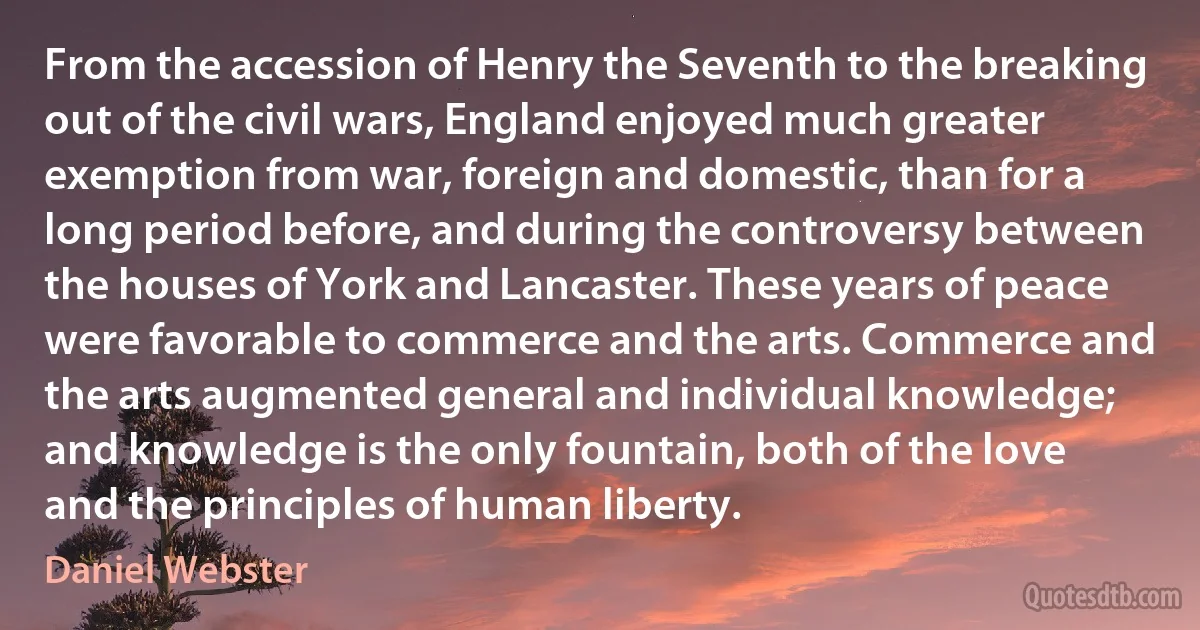Accession Quotes
Who is there that can recognize real intellect, and do reverence to it; and discriminate it well from sham intellect, which is so much more abundant, and deserves the reverse of reverence? He that himself has it!-One really human Intellect, invested with command, and charged to reform Downing Street for us, would continually attract real intellect to those regions, and with a divine magnetism search it out from the modest corners where it lies hid. And every new accession of intellect to Downing Street would bring to it benefit only, and would increase such divine attraction in it, the parent of all benefit there and elsewhere!

Thomas Carlyle
When he entered into the Whig party, he did not conceive that they pretended to any discoveries. They did not affect to be better Whigs, than those were who lived in the days in which principle was put to the test. Some of the Whigs of those days were then living. They were what the Whigs had been at the Revolution; what they had been during the reign of queen Anne; what they had been at the accession of the present royal family.

Edmund Burke
[T]he trade of Africa...is a motive for preventing territory from falling into the hands of other Powers, that those Powers will probably use the dominion which we concede to them for the purpose of crippling the trade that we otherwise should possess; and that seems to be a legitimate motive for the accession of territory which might otherwise be wanting.

Robert Gascoyne-Cecil, 3rd Marquess of Salisbury
Such is, and will be seen to be, the effect of the legislation which the House of Commons must accept if the Treaty of Accession is to be ratified. It will be asked to divest itself of the unrestricted competence and authority which it has gained and maintained over centuries, and which the people of Britain regard as the guarantee of their national independence and political liberties.

Enoch Powell
That noble Lord is of opinion, not only that we ought to exclude Natives from office, but that even by encouraging them to study the arts and learning of Europe, we are preparing the way for the utter destruction of our power in India. I must leave it to the noble Lord to explain what seems to me a rather singular inconsistency in his opinion. I am at a loss to understand how, while utterly contemning education when it is given to Europeans, he should regard it with dread when it is given to Natives. This training, we are told, when given to a European, makes him a bookworm, a twaddler, a man unfit for the active duties of life; but give the same education to the Hindoo, and it arms him with such an accession of intellectual power, that an established government, with an army of 250,000 men, backed by the whole army and navy of England, are to go down inevitably before its irresistible power.

Thomas Babington Macaulay
As it has come to His Majesty's knowledge that some inhabitants of the mahals appertaining to the province of Gujarat have (again) built the temples which had been demolished by imperial order before his accession' therefore His Majesty orders that' the formerly demolished and recently restored temples should be pulled down... The Emperor ordered the destruction of the Hateshwar temple at Vadnagar, the special guardian of the Nagar Brahmans [1693].... Salih Bahadur was sent to pull down the temple of Malarna.

Aurangzeb
It is not to be supposed that she was, or that any one, at the age at which I first saw her, could be, all that she afterwards became. Least of all could this be true of her, with whom self-improvement, progress in the highest and in all senses, was a law of her nature; a necessity equally from the ardour with which she sought it, and from the spontaneous tendency of faculties which could not receive an impression or an experience without making it the source or the occasion of an accession of wisdom. Up to the time when I first saw her, her rich and powerful nature had chiefly unfolded itself according to the received type of feminine genius. To her outer circle she was a beauty and a wit, with an air of natural distinction, felt by all who approached her: to the inner, a woman of deep and strong feeling, of penetrating and intuitive intelligence, and of an eminently meditative and poetic nature.

John Stuart Mill
Not long after his (Justinian) accession, he reaffirmed the penalties which previous Emperors had enacted against the pagans, and forbade all donations or legacies for the purpose of maintaining "Hellenic impiety,"... by making the profession of (Christian) orthodoxy a necessary condition for public teaching Justinian accelerated the extinction of "Hellenism."... This event had a curious sequel. Some of the philosophers whose occupation was gone resolved to cast the dust of the Christian Empire from their feet and migrate.

J. B. Bury
I was... told by a person who had known him [future Emperor Nicholas II] intimately from his childhood, that, though courteous, his main characteristic was an absolute indifference to most persons and things about him, and that he never showed a spark of ambition of any sort. This was confirmed by what I afterward saw of him at court. He seemed to stand about listlessly, speaking in a good-natured way to this or that person when it was easier than not to do so; but on the whole, indifferent to all which went on about him. After his accession to the throne, one of the best judges in Europe, who had many opportunities to observe him closely, said to me, "He knows nothing of his empire or of his people; he never goes out of his house, if he can help it." This explains in some degree the insufficiency of his program for the Peace Conference at The Hague and for the Japanese War, which, as I revise these lines, is bringing fearful disaster and disgrace upon Russia.

Andrew Dickson White
In the seventeenth century, Jahangir writes in his Memoirs that after the third year of his accession, "I demanded in marriage the daughter of Jagat Singh, eldest son of Raja Man Singh (of Amer).”27 Raja Ram Chandra Bundela was defeated, imprisoned, and subsequently released by Jahangir.28 Later on, says Jahangir, "I took the daughter of Ram Chandra Bandilah into my service (i. e. married her).”.

Jahangir
It is related in the Akbar ShahI, that when Sher Shah rendered up his life to the angel of death in Kalinjar, Jalal Khan, his youngest son, was in the town of Rewan, in the province of Bhata, and his eldest son ‘Adil Khan, the heir-apparent, in the fort of Runthur (Ranthambhor). The nobles perceived that ‘Adil KhAn would be unable to arrive with speed, and as the State required a head, they despatched a person to summon Jalal Khan who was nearer. He reached Kalinjar in five days, and by the assistance of ‘Isa Hajjab and other grandees, was raised to the throne near the fort of Kalinjar, on the 15th of the month RabI'u-1 awwal, 952 A. H. (25th May, 1545 CE). He assumed the title of Islam Shah... "After his accession, he ordered the Raja of Kalinjar, who had been captured with seventy of his adherents, to be put to death, and directed that not one of them should be spared...

Sher Shah Suri
Mr. Burke talked in very high terms of Dr. Adam Smith; praised the clearness and depth of his understanding, his profound and extensive learning, and the vast accession that had accrued to British literature and philosophy from these exertions, and described his heart as being equally good with his head and his manners as peculiarly pleasing. Mr. Smith, he said, told him, after they had conversed on subjects of political economy, that he was the only man, who, without communication, thought on these topics exactly as he did.

Edmund Burke



